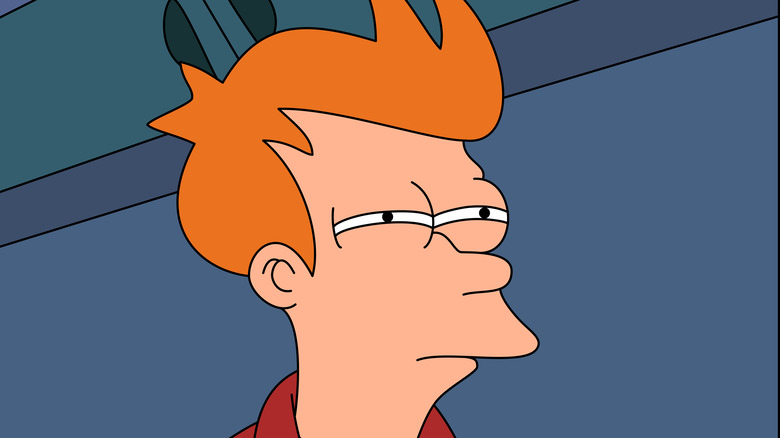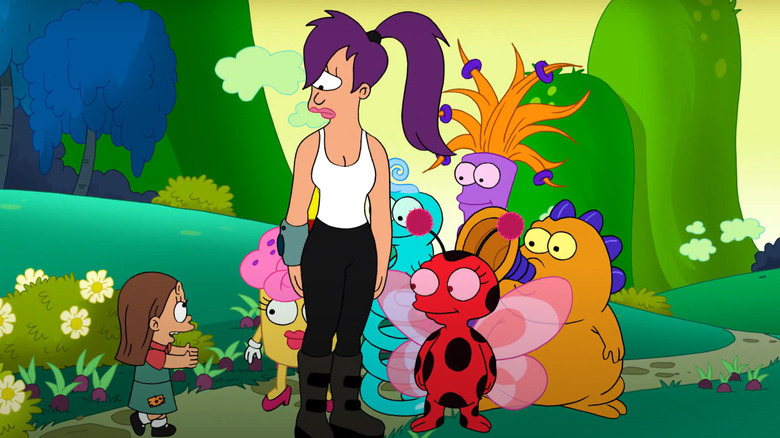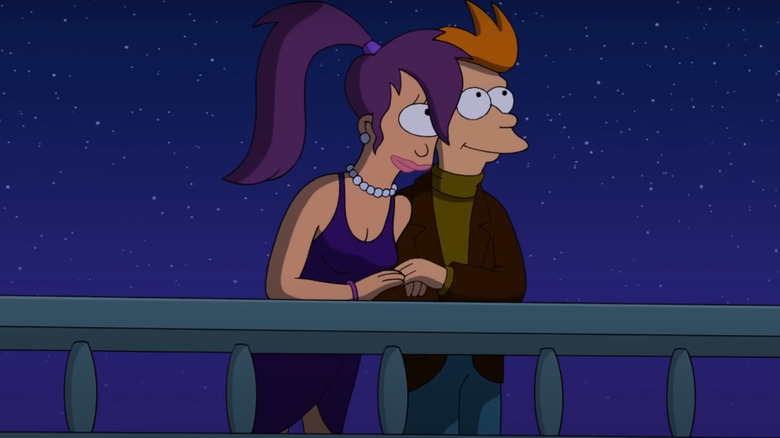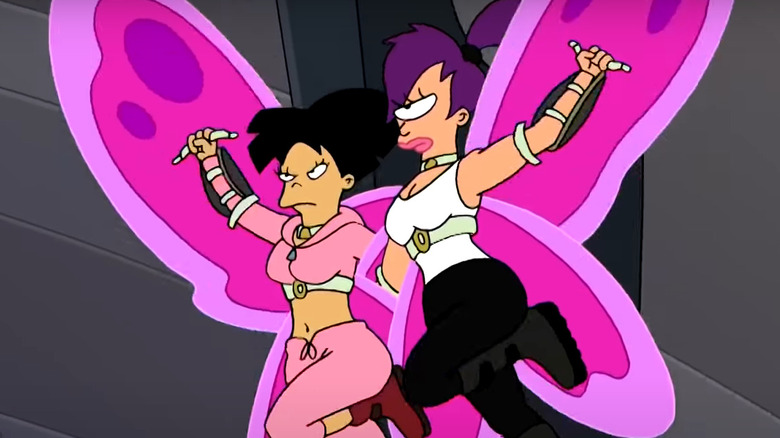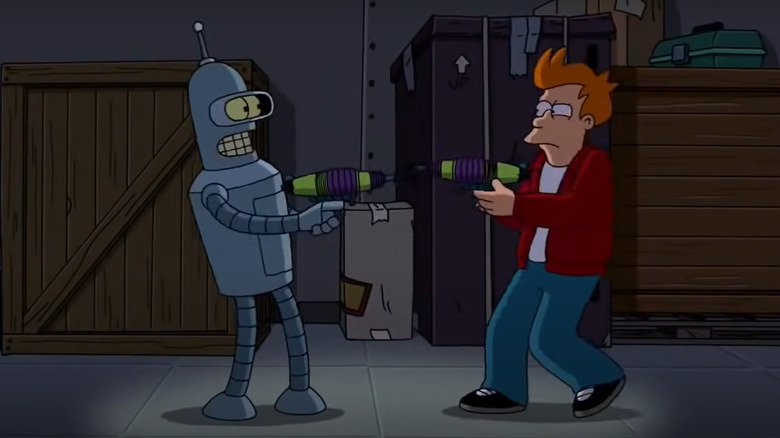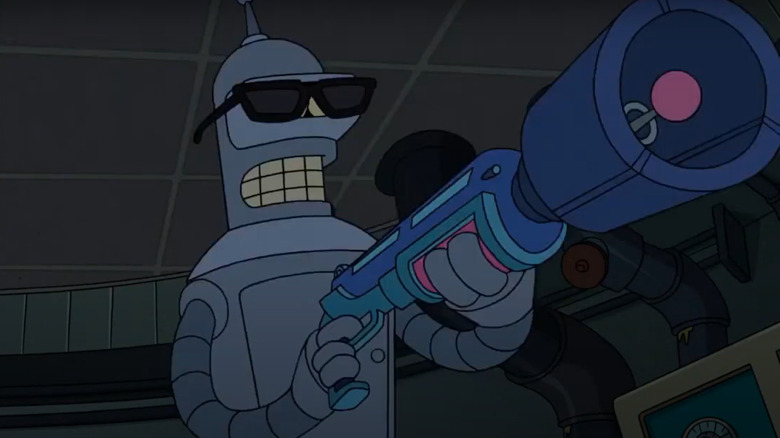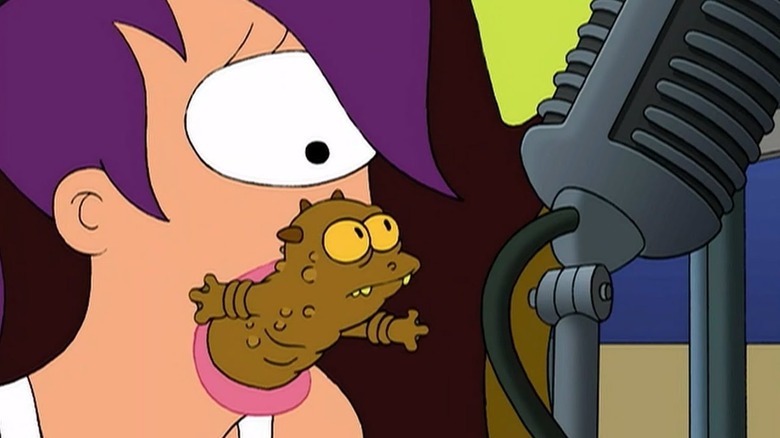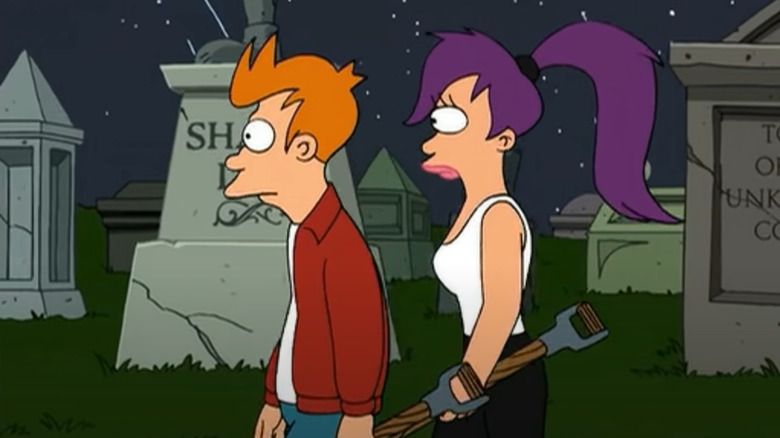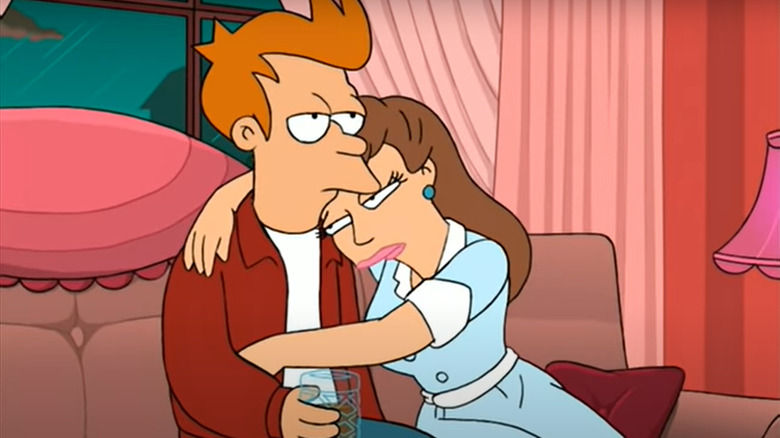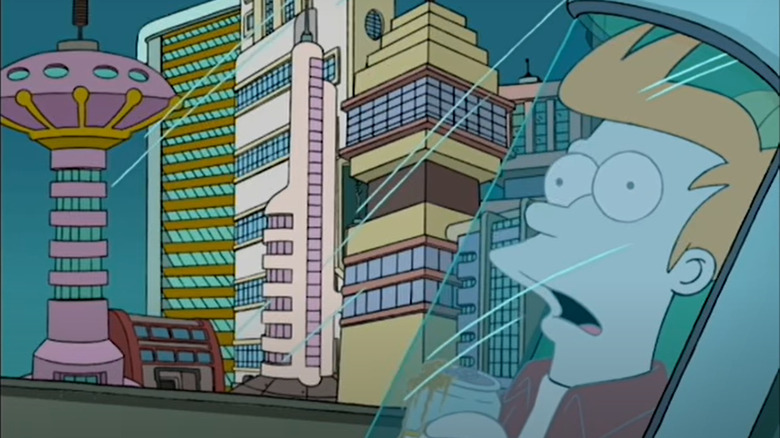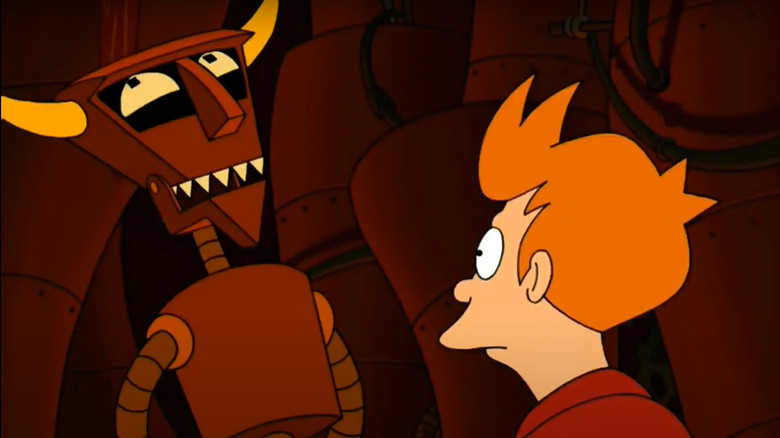Every Season Of Futurama Ranked Worst To Best
"Futurama" tells the story of Fry, a loveably immature goofball who accidentally freezes himself in a cryogenic chamber in the year 2000, only to be reawakened in the year 2999 in a technologically advanced future. Fry manages to hunt down a descendent of his, Professor Hubert J. Farnsworth, the brilliant-yet-absent-minded mad scientist who started the interplanetary delivery service Planet Express Inc. to finance his wacky experiments. Also working for Planet Express are the cycloptic Leela, the foul-mouthed Bender, the sweet Amy Wong, the alien crustacean Zoidberg, and the ever-working Hermes Conrad. Throughout the show's run, Fry and co. went on a series of intergalactic and interdimensional adventures that are equal parts sci-fi craziness and oddball whimsy.
The show is the brainchild of "Simpsons" creator Matt Groening, and he brings along his signature sense of humor that combines plenty of absurd gags and cultural satire balanced with just the right amount of heart. However, one of the things that set "Futurama" apart from its yellow-skinned cousin is the surprising amount of attention paid to so many of its jokes. From advanced mathematics to quantum physics to genetics, the show's writers clearly revisited some of their old college textbooks for inspiration, which worked in its favor as these jokes have kept fans coming back season after season (and even making a live-action episode). Yet not every season is equal, which is why we're taking a look at every season of "Futurama" ranked worst to best.
Season 8
Season 8 has the largest number of mediocre episodes in the entire "Futurama" run. That's not to say it's horrible, but it largely feels forced and uninspired. Take, for example, the episode "Yo Leela Leela," a parody of the Nick Jr. series "Yo Gabba Gabba!" This episode follows Leela as she develops a kid's show called "Rumbledy-Hump" which becomes a huge hit. However, it's revealed that she's been going to a planet inhabited by creatures called Humplings and passing off their daily lives as her original stories. It's an interesting attempt to poke fun at children's programming, but so many of its references are lazy and Leela is unusually mean-spirited here.
Then there's the awkward and uncomfortable "Neutopia," in which the crew of the Planet Express land on a planet and encounter an alien that strips them of their sexual anatomy. Things seem to be going fine, but the crew misses the joys of sex and demands to have their reproductive organs restored, which the creature obliges, only to have the crew members swap, ahem, parts. Besides feeling rushed and uninspired, this episode blew its chance to say something interesting about men and women by simply coming off as crass and shallow. It's not a bad premise, but it was a missed opportunity to incorporate some clever commentary on the sexes into a raunchy plot.
Season 7
The second season on Comedy Central was pretty rough, with the low point being "The Futurama Holiday Spectacular," although it's not like holiday specials have a long history of being particularly good, right Star Wars? This episode features three separate storylines: "Xmas," which sees the previously extinct pine tree make a viscous comeback; "Robanukah," wherein Bender makes up a new holiday to get out of work; and "Kwanzaa," which features Coolio returning as Kwanzaabot. "The Futurama Holiday Spectacular" has a few laughs, but each segment largely follows the same plot structure, making it feel repetitive and dull.
"The Late Philip J. Fry," on the other hand, is not only a high point of season 7 but a highlight of the series. Marking a development in the budding romance between Leela and Fry, the episode shows Leela getting more and more frustrated with Fry's flakiness. Determined to finally keep his promise, Fry puts in extra effort to arrive at her birthday dinner on time but gets caught up in the Professor's time machine experiment which sends the two of them and Bender centuries into the future with no way back. It's pure "Futurama," being a heady yet hilarious take on a classic sci-fi trope, delivered with plenty of heart that never gets too sappy.
Season 9
The penultimate season of "Futurama" proved that the series didn't deserve to last much longer. It's not a terrible season, but its mediocrity feels worse compared to the show's previous high points. "The Butterjunk Effect" satirizes sports and the controversies around athletes using steroids with plenty of laughs to be had, though many gags are basically low-hanging fruit and lack the satirical punch of previous seasons. "Zapp Dingbat" is another episode that delivers a fun premise but not the laughs it deserves, with Leela's mother leaving her father to begin an affair with Zapp Brannigan and making sure everyone knows about it. Again, there are some worthy gags here, but it mostly feels like an episode from a 90s sitcom that just happens to take place in the future.
However, season 9 did kick off with a strong start in "The Bots and the Bees," which sees Bender raise a son that was conceived through, ahem, relations with a sentient vending machine named Bev that was built by the Professor. While Bender is initially resistant to raise the child as his own, Bev's sudden departure forces him to step up and actually be a decent father. While being a hilarious high-tech sendup of paternity disputes, it also gives audiences a look into the (slightly) softer side of Bender.
Season 10
The "Futurama" revival on Comedy Central was pretty inconsistent overall, but its final season managed to mostly right the wrongs of its return with some episodes that came close to the previous run's greatness. "Murder on the Planet Express" is a laugh-out-loud parody of such classic sci-fi horror films as "Alien" and "The Thing" that also delivers plenty of character-driven moments. When the Planet Express crew accuses each other of messing with one another's stuff, the Professor sends them on a team-building trip to encourage them to reestablish trust. However, the crew finds themselves being hunted by an alien creature, forcing them to work together to survive.
The big stinker for this season is "Forty Percent Leadbelly," which follows Bender as he sets out to become a folk singer, a dream he's always secretly held except for the not-so-secret Season 3 episode "Bendin' in the Wind." With only a few funny jokes, "Forty Percent Leadbelly" mostly meanders in a plot that leaves much to be desired. Luckily, it's more than compensated for with the series finale titled "Meanwhile," wherein Fry is about to propose to Leela, but when he believes that she stood him up, he decides to set things right with a time manipulation device created by the Professor, only to put the time-space continuum at risk. We won't spoil much here, but "Meanwhile" perfectly blends science fiction craziness, uproarious gags, and just the right amount of sentiment, perfectly embodying what makes "Futurama" so great.
Season 6
The sixth season of "Futurama" marked its move from Fox to Comedy Central after its seeming cancellation in the form of four direct-to-DVD movies later chopped into episodes. The strongest episodes are the first four comprising the "Bender's Big Score" storyline in which Fry discovers he has a tattoo of Bender on his butt. A group of aliens reveal that the tattoo has a secret equation that enables time travel and, after taking control of Bender, use him to go back in time to plunder riches from Earth's past. There's a lot going on in these first four episodes, but each subplot is given the proper amount of time to develop while dishing out near-constant laughs.
"Into the Wild Green Yonder," the concluding four-part storyline of the season, is another strong set of episodes. In it, Amy's parents Leo and Inez are setting out to destroy parts of the galaxy to turn them into tourist attractions. Leela, however, becomes enraged at the damage these development projects are doing to extraterrestrial wildlife and joins a group of eco-feminists to stop them. Meanwhile, Fry develops the ability to hear others' thoughts and is enlisted by a shadowy group of literal tinfoil hat-wearing telepaths to help prepare for the return of an ancient peaceful alien race. This storyline is surprisingly imaginative and gives every character a chance to shine among the galactic craziness. The satire is as sharp as ever, taking shots at multiple targets and mostly hitting the mark.
Season 2
Season 2 of "Futurama" wasn't quite as strong as the debut season but still had plenty of far-flung hilarity on tap and greatly expanded the universe it established. One of the high points of the sophomore season is "The Problem with Popplers," which sees the crew of the Planet Express get the munchies and land on a planet looking for food, only to stumble upon an extremely delicious edible lifeform that they soon turn into a fast food franchise. It's soon revealed that the edible lifeforms that Earth's humans have been consuming are actually the younglings of another alien race that was using the planet as a nursery, and they're not happy! This episode takes clever swipes at numerous groups, including PETA, and is packed with inside jokes and references to other sci-fi properties. It's a darkly humorous episode that goes to some subversive places with surprising dexterity, never getting too crass.
Another memorable episode from this season is "A Flight to Remember," a straight-up parody of James Cameron's "Titanic." The Professor rewards his crew with a space cruise ship vacation where Bender falls for the wealthy Countess de la Roca who reciprocates his feelings for her despite his boorishness. Eventually, the ship comes too close to a black hole forcing everyone onboard to evacuate, which jeopardizes Bender's new romance. This episode mirrors numerous beats from the source material, but it works extremely well. It's able to satirize classic moments from "Titanic" without ever feeling forced or obvious.
Season 3
By this point in the series the writers of "Futurama" were firing on all cylinders, churning out stellar episode after stellar episode with only the occasional minor dud. One noteworthy episode is "Parasites Lost," which sees Fry develop improved intelligence and physique from sentient worms he accidentally ingested when he ate a rotting egg salad sandwich from a truck stop. The Professor has Leela distract Fry as he sends microscopic robotic versions of the crew into his body (ala "Fantastic Voyage") to get rid of the worms, but things get complicated when Leela starts to fall for the new Fry, developing the budding romance between the two.
However, the real gem of this season was "The Luck of the Fryrish." The story centers on Fry getting fed up with his bad luck at the racetrack and deciding to go back to his old home to dig up a rare seven-leaf clover, which he believes will give him good luck. When he discovers that his brother Yancy may have taken it, Fry becomes determined to dig up his brother's grave to get the clover back. This was an uncharacteristically touching episode where Fry's petty behavior is intercut with flashbacks to his early life, giving us a look at his past relationship with his sibling. Of course, in true Fry fashion, he learns that his brother may not have been the fraud he thought he was in one of the more heartfelt endings of the series.
Season 4
Season 4 was proof that the creators behind "Futurama" knew what they were doing and had a clear vision of what made the show so great. The best episode of the season (and certainly one of the best in the entire series) is "Roswell That Ends Well," which follows the crew of the Planet Express as they accidentally crash land in Roswell, New Mexico in 1947. Zoidberg gets apprehended by the military and experimented on, Bender gets taken apart and studied, and Fry unintentionally ensures that he'll be born in the future when he and his grandmother, well ... those of you who've seen "Back to the Future" will catch the reference. Speaking of references, one of the many charms of this episode is how well it incorporates so many nods into the plot without coming off as cheap. Not only will it appease casual "Futurama" fans, but fans of sci-fi in general.
For the softer side of things, look no further than "Leela's Homeworld," an episode that gives Leela a much-deserved spotlight. She returns to her old orphanarium to give a speech, but after Bender arouses the anger of underground mutants for dumping toxic waste into their home, Leela, Bender, and Fry are kidnapped by the mutants. They manage to escape, but Leela stumbles upon a couple of mutants who may have a connection to her long-lost parents and pursues them for answers, resulting in one of the more tear-jerking episodes in the entire series.
Season 1
"Futurama" has one of the strongest debut seasons of any TV show. In addition to performing the obligatory duties of introducing the characters, the world they inhabit, and the style of humor it was aiming for, this inaugural season had already crystallized so much of the detail-oriented gags that would typify the show for the rest of its run, perfectly setting the stage for greater things to come. Take the first episode, "Space Pilot 3000," which chronicles Fry's experience of being frozen for a thousand years only to wake up in a future he doesn't recognize. It's a simple premise, but it does a spectacular job of establishing its main characters' quirks and plants the seeds for bonds that will be developed throughout the series.
Speaking of bonds, it should be said that the friendship between Fry and Bender is one of the best in TV history, and is perfectly demonstrated in "I, Roommate." Fry has been living in Planet Express, but after making a mess of the office he's forced to look for a place of his own. While he moves in with Bender for a bit, it's clear that both of them need a place suitable for both of their needs (especially since Bender's apartment is little more than a closet and the robot loudly dreams of killing all humans). While the two will always butt heads and screw each other over, it's such a delight when their weird friendship brings them back together again.
Season 5
And here we are, the crème de la crème of "Futurama." With nary a middling episode in sight, Season 5 wonderfully marries its imaginative sci-fi ideas with goofball humor and heartfelt character work. Dog lovers will appreciate "Jurassic Bark," one of the highlights of this season which follows Fry as he discovers a fossil of his dog from the past and sets out to clone him. This strains his relationship with Bender, who believes that Fry will abandon him. We won't spoil the touching ending, but it's a surprisingly thoughtful exploration of friendship and the loyalty of a dog.
This was originally set to be the final season of "Futurama" (the show has a fascinating cancellation history), which meant that the last episode of this season was meant to be the show's finale. While it would eventually move to Comedy Central, the show didn't have the same pizazz after Season 5, especially considering how great the supposed finale is. "The Devil's Hands Are Idle Playthings" sees Fry learning how to play the holophonor to win Leela's heart. After failing, Fry makes a deal with the Robot Devil to improve his musical skills. A bizarre stroke of luck results in Fry getting the Robot Devil's hands and sees his virtuosity take off, but the Robot Devil — bothered by the bad deal — makes deals of his own. It's not a definitive ending to Leela and Fry's will-they-or-won't-they relationship, but it's a sweet open-ender that's perfect all on its own.
